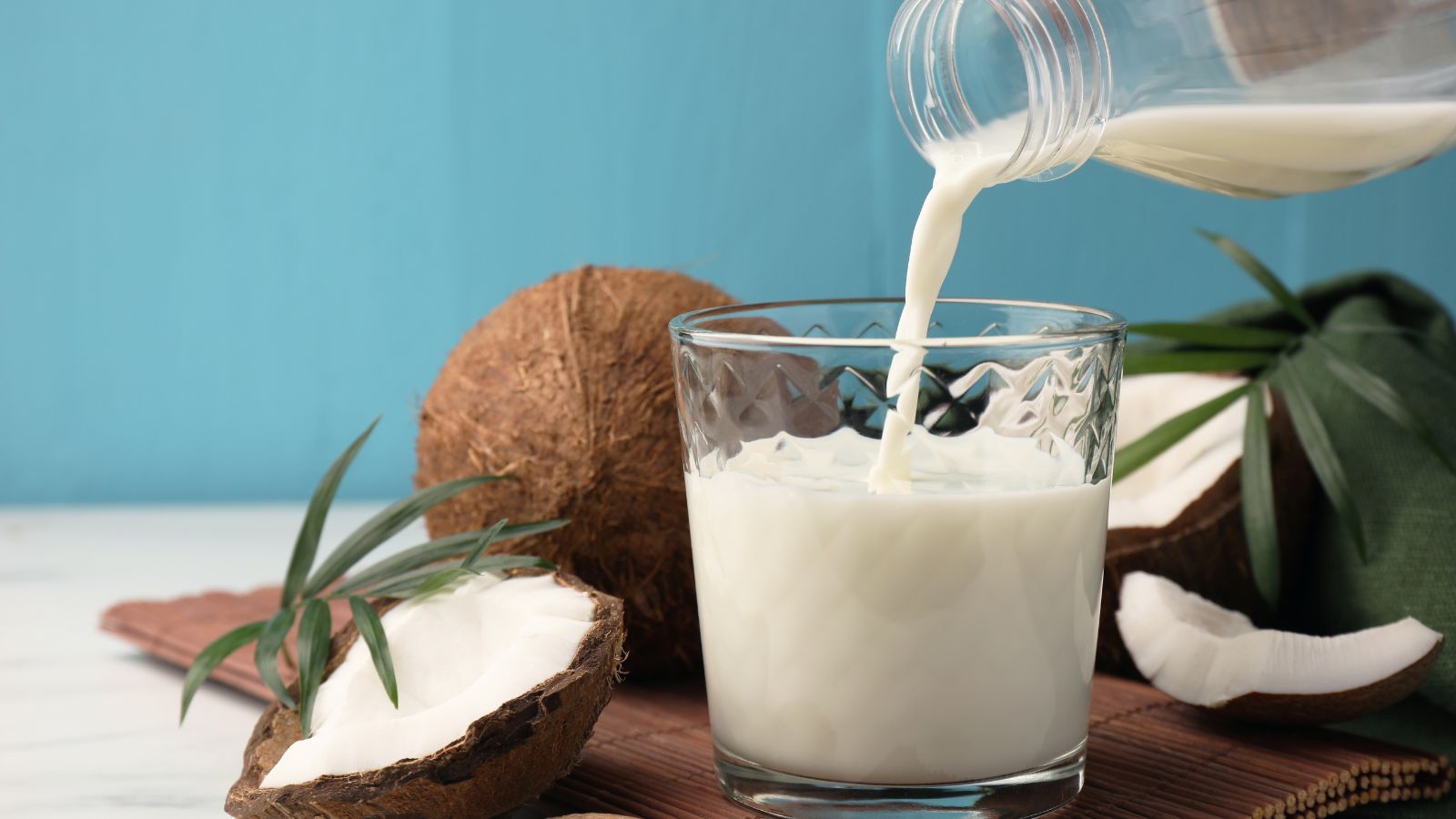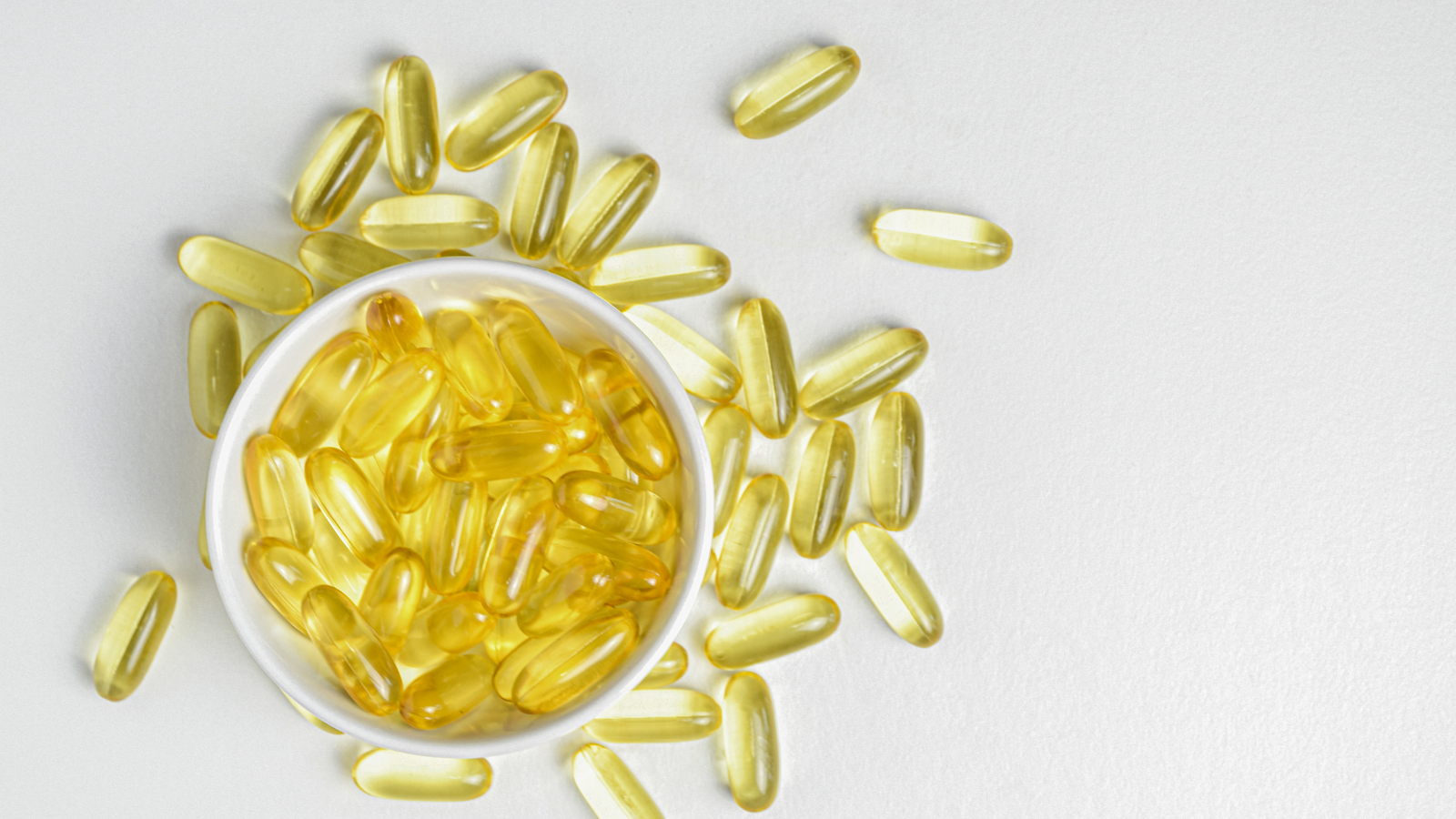Plant-based milks have become a significant blessing for individuals with lactose intolerance. These provide a dairy-free and gluten-free alternative while offering various health benefits. Among these alternatives, coconut milk is a readily available and versatile option. Not only does it serve as an excellent substitute for traditional dairy milk, but it also boasts a rich nutritional profile with multiple health-enhancing nutrients. Let’s explore what coconut milk is, its nutritional value, coconut milk benefits, uses, and some simple recipes using coconut milk.
What is the nutritional value of coconut milk?
Coconut milk is simply a blend of coconut meat and water. It is high in calories. It contains various vitamins and minerals that complete its nutritional profile. One cup of coconut milk offers the following nutrients:
- Total Fat-48 grams
- Saturated Fat-43 grams
- Polyunsaturated Fat-0.5 grams
- Monounsaturated Fat-2 grams
- Cholesterol-0 milligrams
- Sodium-29 milligrams
- Total Carbohydrates-6.4 grams
- Protein-4.6 grams
- Calcium-41 milligrams
- Iron-7.5 milligrams
- Potassium-497.2 milligrams
It is also rich in other minerals and vitamins such as vitamins A, B12, C, magnesium, copper, selenium, and zinc. Coconut milk also has a low glycemic index (GI) of 40, considered good for diabetes. The glycemic load (GL) of coconut milk is 1.1, which means that it increases blood glucose levels slowly.
What are the coconut milk benefits on health?
Including coconut milk in your diet, whether in curries, smoothies, or desserts, provides not only a rich and creamy flavour but also a range of health benefits. It is good for heart, supports ageing, and digestion and helps in weight loss. Here are the coconut milk benefits on health:
1. Good for heart
Coconut milk contains lauric acid, a healthy saturated fat that may contribute to heart health by promoting a balanced cholesterol profile. Additionally, the medium-chain triglycerides (MCTs) in coconut milk may support heart function.
2. Prevents the risk of cancer
One of the differetiating coconut milk benefits is its anti-cancer effects. Antioxidants present in coconut milk, such as selenium, may have potential cancer-fighting properties.
3. Boosts immunity and prevents infections
One of coconut milk health benefits for children and older adults is the strengthening of immunity and resistance against infections. The antimicrobial properties of coconut milk, particularly due to lauric acid, can enhance immune function. It helps the body defend against infections. Including coconut milk in your diet may provide a natural boost to your immune system.
4. Weight loss
Another potential coconut milk benefits is its effects on weight loss. The medium-chain triglycerides (MCTs), a type of healthy fat in coconut milk, can potentially aid in weight loss. It is known to increase feelings of fullness and boost metabolism. These fats are efficiently converted into energy, and their inclusion in a balanced diet may support weight management.
5. Diabetes
Coconut milk has a low glycemic index of 40, which means it has a minimal impact on blood sugar levels. Those with diabetes may find it useful in managing blood sugar and insulin levels.
6. Healthy ageing
The antioxidants and nutrients in coconut milk contribute to overall skin health, potentially slowing down the ageing process. Lauric acid also exhibits anti-inflammatory properties that may promote healthy ageing.
7. Supports digestion
Another potential coconut milk benefit is its effect on digestion. Coconut milk contains fibre, aiding in digestion and promoting a healthy gut. Additionally, medium-chain triglycerides (MCTs) may have antimicrobial properties that balance gut bacteria, supporting digestive health.
What are other coconut milk uses?
Besides its edible uses, coconut milk offers various topical benefits for skin and hair care. This is why it is used in various skin and haircare preparations. Here are the coconut milk benefits when used topically.
1. Glowing skin
Coconut milk is rich in vitamins C and E. These vitamins can help nourish the skin, promote collagen production, and contribute to a healthy, glowing complexion. Apply fresh coconut milk directly to your face and body. Leave it on for 15-20 minutes before rinsing with lukewarm water. Use it 2-3 times a week for glowing skin.
2. Diabetic foot ulcers
Coconut milk is used as a main ingredient in diabetic foot ulcer treatment creams. The antimicrobial properties of coconut milk are good for diabetic foot ulcers. Applying coconut milk topically can help keep the affected area clean and moisturised, supporting the healing process. Soak a clean cloth or cotton ball in coconut milk. Gently dab the affected area and leave it on. Repeat 2-3 times a day until improvement is noticed.
3. Makeup remover
Coconut milk can serve as an effective and gentle makeup remover. Use a cotton pad or your fingertips to apply coconut milk. To dissolve makeup, gently massage it over your face. Rinse with water and cleanse your face, followed by moisturiser.
4. Repairs sun damage
The fatty acids and vitamins in coconut milk may aid in repairing sun-damaged skin. Mix coconut milk with aloe vera gel or cucumber juice. Apply the mixture to sun-damaged areas and leave it on for 20-30 minutes. Use this remedy 2-3 times a week for soothing effects.
5. Removes dark spots
The antioxidants in coconut milk may help lighten dark spots and pigmentation. Regular application can contribute to a more even skin tone over time. Combine coconut milk with a few drops of lemon juice. Apply to dark spots, leave on for 15 minutes, and rinse.
6. Skin problems
Coconut milk’s anti-inflammatory and soothing properties can benefit conditions like dermatitis and psoriasis. It can help alleviate itching and redness associated with these skin problems. Apply coconut milk directly to affected areas. Leave it for 15-20 minutes, then rinse with cool water. Use regularly to soothe irritated skin.
7. Natural hair conditioner
The moisturising properties of coconut milk make it an excellent natural hair conditioner. It can be applied to both hair and scalp, helping to hydrate and nourish, leaving hair soft and manageable. Massage coconut milk into your hair and scalp. Leave it on for 30 minutes, followed by shampoo. Use 1-2 times a week for silky and smooth hair.
8. Repairs damaged hair
Coconut milk’s fatty acids can penetrate the hair shaft, nourishing damaged hair. It may help reduce split ends, improve hair elasticity, and contribute to overall hair health. Combine coconut milk with a few drops of argan oil. Apply to damp hair, and leave for 30 minutes. Shampoo and condition your hair afterwards.
How to use coconut milk?
Coconut milk can be included in your meals in multiple ways. Here are some options:
- Breakfast cereal: Make your breakfast cereal extra tasty by pouring coconut milk instead of regular milk. Add a tablespoon of honey for extra flavour.
- Smoothies: For a creamy and delicious smoothie, blend coconut milk with your favourite fruits and a bit of honey. You can have it daily for breakfast.
- Desserts: Add coconut milk to your milk-based desserts instead of cow’s milk for a sweet and coconutty flavour.
- Homemade ice creams: When making homemade ice cream, you can use coconut milk for a smooth and creamy taste.
- Oatmeal: Cook your morning oatmeal in coconut milk for a rich and creamy version. Curries: You can make your curries tasty and creamy by using coconut milk as a base. It adds a bit of sweetness and makes your curry extra healthy.
- Soups: For a silky and flavorful soup, add coconut milk to recipes like Thai coconut soup. It adds a delicious coconut flavour and a smooth texture.
- Baking: You can also use coconut milk when baking cakes and muffins. It’s a simple way to make your baked goods dairy-free.
Some easy coconut milk recipes
Here are some super easy coconut milk recipes you must try at home.
1. Veg Thai curry
To make a delicious Veg Thai Curry with coconut milk, start by sauteing a mix of colourful vegetables like bell peppers, carrots, and broccoli in a pan. Add tofu cubes for protein. Stir in a can of coconut milk and Thai red curry paste, bringing the mixture to a gentle simmer. Add soy sauce, lime juice, and a touch of brown sugar for a perfect blend of sweet, spicy, and savoury flavours. Serve over steamed white rice and garnish with fresh coriander for a delightful and aromatic Thai-inspired meal.
2. Coconut fish curry
To prepare coconut fish curry, cook onions, garlic, and ginger in a pan. Add your favourite white fish fillets and gently brown them. Pour the prepared coconut milk or canned coconut milk, along with red curry paste, allowing the flavours to meld as it simmers. Add lime juice, fish sauce, and a pinch of brown sugar. Serve this creamy and flavorful coconut fish curry over steamed rice, topped with fresh herbs and serve it with rice.
3. Coconut milk chia seeds pudding
For a simple Coconut milk chia seeds pudding, mix chia seeds and coconut milk in a bowl, stirring well. Sweeten the mixture with honey or maple syrup and let it sit in the refrigerator for a few hours or overnight. Top with fresh fruits or shredded coconut before serving for a delicious and nutritious treat.
Can coconut milk cause any side effects?
Coconut milk poses health benefits for heart, diabetes, skin, cancer, infection, and ageing. It may also show any side effects when used in excess. The expected coconut milk side effects include:
- Weight gain: Coconut milk is high in calories and saturated fats, and may contribute to weight gain over time. Have it in moderation to avail its benefits without the risk of unwanted effects.
- Constipation: While coconut milk can be a healthy addition, its high-fat content might lead to constipation if consumed excessively. Ensure a balanced diet with fibre-rich foods to maintain digestive health.
- Allergies: Some individuals may be allergic to coconut milk, experiencing symptoms like itching or swelling. If you have a history of food allergies, consult your doctor before having it.
- High cholesterol: Regular consumption of coconut milk, high in saturated fats, may contribute to elevated cholesterol levels. Keep track of your cholesterol level if you have heart problems.
Coconut milk is a great option for those with lactose intolerance. It offers a dairy-free and gluten-free alternative with numerous health benefits. Rich in essential nutrients, including healthy fats, vitamins, and minerals, coconut milk can increase the nutritional value and flavour of your food. Making coconut milk at home is a simple process. All you need to do is, take a mature coconut, take it meat part and blend it with 2-3 cups of water. Strain this mixture to obtain the creamy liquid. This fresh coconut milk can be stored in the refrigerator for a few days. If you plan to use the coconut milk within a few days, store it in a clean, airtight glass container and place it in the refrigerator. Homemade coconut milk has a shelf-life of about 3-4 days. Before using the homemade coconut milk, give it a good shake. If you want to store coconut milk for a long period, consider freezing it. Put the coconut milk in ice cube trays or freezer-safe containers. Have it in moderation to avoid constipation, high cholesterol and any other side effects.



